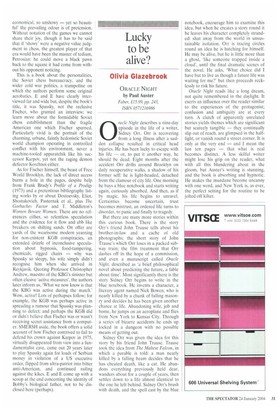Lucky to be alive?
Olivia Glazebrook
ORACLE NIGHT by Paul Auster Faber, £15.99, pp. 243, ISBN 0571216986 Oracle Night describes a nine-day episode in the life of a writer, Sidney Orr. Orr is recovering from a long illness after a sudden collapse resulted in critical head injuries. He has been lucky to escape with his life — or, to put it another way, he should be dead. Eight months after the accident Orr drifts around Brooklyn on daily recuperative walks. a shadow of his former self: he is light-headed, detached from the clamour of city life. One morning he buys a blue notebook and starts writing again, curiously absorbed. And then, as if by magic, his life begins to unravel. Certainties become uncertain, trust becomes mistrust, an ordered life turns to disorder, to panic and finally to tragedy.
But there are many more stories within this curious book. There is the story Orr's friend John Trause tells about his brother-in-law and a cache of old photographs; the short story of John Trause's which Orr loses in a packed subway train; the film treatment that Orr dashes off in the hope of a commission, and even a manuscript called Oracle Night, described as 'a brief philosophical novel about predicting the future, a fable about time'. Most significantly there is the story Sidney Our begins to write in the blue notebook. He invents a character, a literary agent named Nick Bowen, who is nearly killed by a chunk of falling masonry and decides he has been given another chance at life. Abandoning wife, job and home, he jumps on an aeroplane and flies from New York to Kansas City. Through a series of bizarre accidents he ends up locked in a dungeon with no possible means of getting out.
Sidney Orr was given the idea for this story by his friend John Trause. Trause took the idea from The Maltese Falcon, in which a parable is told: a man nearly killed by a falling beam decides that he has cheated death, like a cat. He abandons everything previously held dear, wanders about for a couple of years, then settles down to a life almost identical to the one he left behind. Sidney Orr's brush with death, and the spell cast by the blue
notebook, encourage him to examine this idea, but when he creates a story round it he leaves his character completely stranded: shut away from the world in unsustainable isolation. Orr is tracing circles round an idea he is hatching for himself. He may be alive, but he is little more than a ghost, 'like someone trapped inside a cloud', until the final dramatic scenes of the novel. He asks, 'What choice did I have but to live as though a future life was waiting for me?' but then proceeds recklessly to risk his future.
Oracle Night reads like a long dream, not quite remembered in the daylight. It exerts an influence over the reader similar to the experiences of the protagonist; confusion and ambiguity are at every turn. A clutch of apparently unrelated stories yields themes which are significant but scarcely tangible — they continually slip out of reach, are glimpsed in the halflight, or vanish round a street corner. It is only at the very end — and I mean the last ten pages — that what is real becomes distinct. A less skilful writer might lose his grip on the reader, what with all this blundering about in the gloom, but Auster's writing is stunning, and the book is absorbing and hypnotic. He makes the mundane become uncanny with one word, and New York is, as ever, the perfect setting for the routine to be jolted off kilter.


























































 Previous page
Previous page